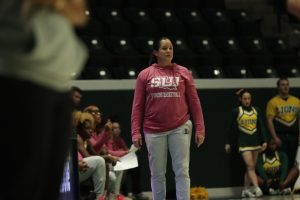Louisiana is struggling without a sex-related elective course
September 27, 2018
There is this meme of a ‘90s sex education class where a male student asked, “What if I want to have sex before I get married?” To which the teacher responded, “Well, I guess you just have to be prepared to die.”
With the advancements in technology and more scholarly research in the past decade or so, we are able to ignore that instructor’s blunt message. But this scenario does beg the question: Why is sex education not taught widespread in Louisiana?
Since it would be difficult to fit the topic into the current high school curriculum, I believe that sex education should be taught throughout schools as an elective, and the school’s counseling center should promote the class since it has the knowledge that is applicable outside the classroom.
I went to a private, Catholic, all-boys high school in the middle of Baton Rouge. For me, sex education was taught as a part of sophomore religion and some speeches senior year, kind of. The in-class lesson was targeted more towards addressing the male temptations while in high school. For for senior year, we were essentially told not to rape women while intoxicated. The one real-world scenario that was discussed was if you made a woman pregnant, how would you handle the scenario?
The point is that there wasn’t a lesson on noticing the signs of syphilis. There was not a lesson on how Louisiana has one of the highest rates of HIV and AIDS and that Baton Rouge and New Orleans are the two greatest areas affected. There wasn’t a lesson on how to check your body for signs of any sort of sexually transmitted disease contraction. There wasn’t a lesson on the affordability and accessibility of medicine for these diseases contracted by careless encounters.
So, why do we ignore it? Are the truths behind the issue too ugly for a high school audience?
The way I see it, sex education is almost like managing finances. It does not seem relevant to teens until they are in a situation where they have no choice but to blindly face it. It is not important until it is too late.
In terms of implementing a program into schools, there should be an elective course, but it should be taught by someone certified in either a microbiological or sociological field. The class should be uncomfortable but informative and productive. There is a plethora of information to be covered, and expanding upon several topics over the course of a semester will be rewarding for students.
For younger students, male and female, the course can begin with the hormonal and physical changes that puberty causes. Gender-specific changes could accompany this topic, since it is important to know the experiences that the other sex will face.
In a more mature class, students should be taught what consent is and is not. Not hearing ‘no’ does not mean ‘yes.’
Going down a darker tangent, both male and female students should be aware of some of the necessary procedures if they themselves were raped: how to report, how immediate they need to be, why they should not shower immediately, how to obtain the rapist’s DNA, etc. These details may not seem important, but I am certain that the majority of students on this campus know someone who has been sexually assaulted.
Students should know how common diseases are contracted, their side effects, how and where to get tested as well as how and where to get treatment. Other points to be mentioned throughout this course could include the importance and effectiveness of protection, affordability of certain medicines and how to deal with a terminal illness.
Breathe. The teacher in me has been muted for the rest of the article.
If I could go back in high school and take a course like this, I would. Not because I wrote the lesson plans, but because the topics discussed would have had an immediate correlation to the newfound experiences that puberty brought upon me in high school. Honestly, I would have been haunted by some of the material, but I would be thankful that it was brought to my attention.
For me, sex education was not a prominent topic in high school, but a phrase that was joked about because as teenage boys, we thought we knew it all. The truth is that we only knew a small sliver of information about sex. We may not have known the multiple ways to determine whether a cell wall is gram positive or gram negative in high school, but we sure did remember that the mitochondria was the powerhouse of the cell.
Be youthful, but remember to be careful.









